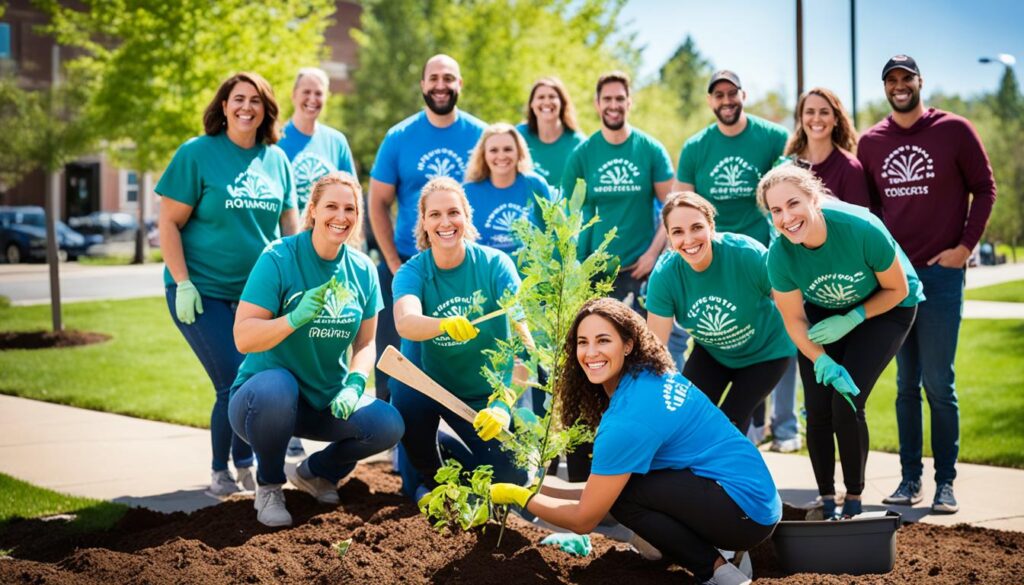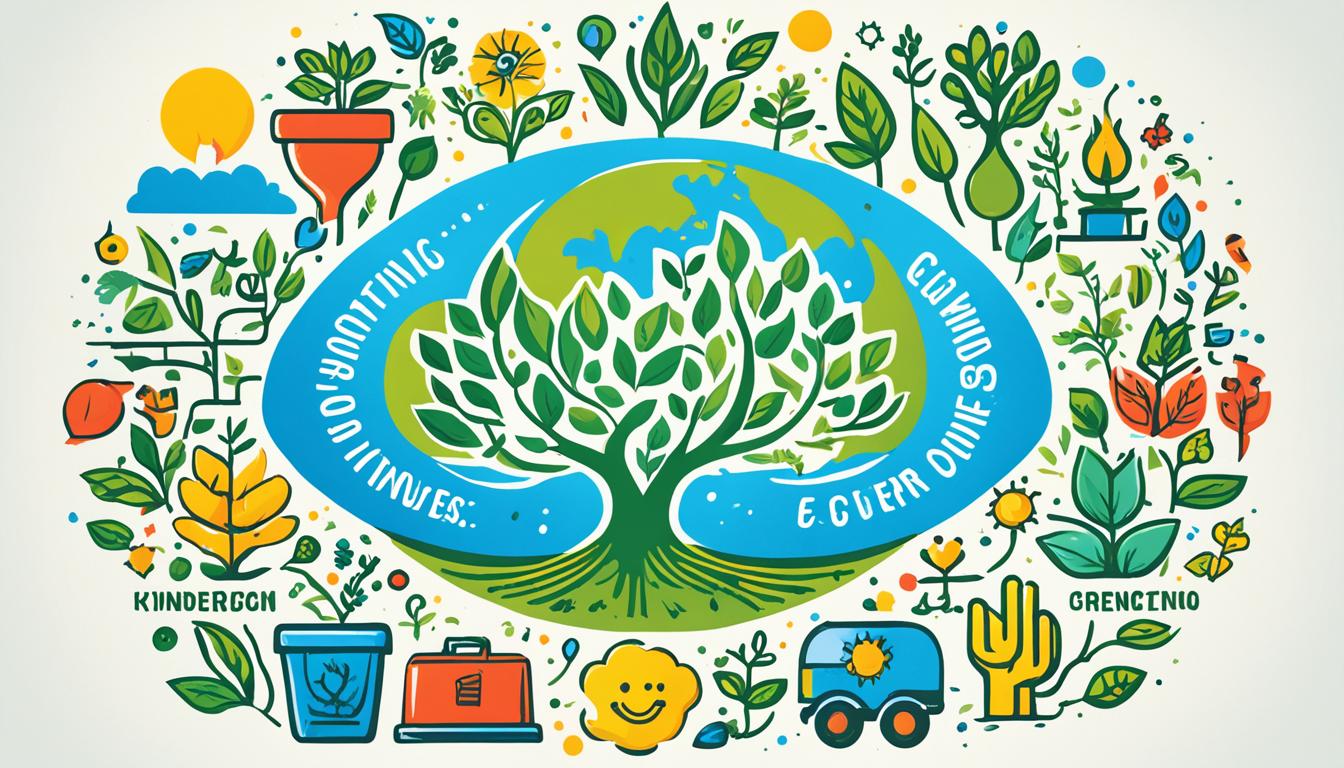“Thousands of candles can be lighted from a single candle, and the life of the candle will not be shortened. Happiness never decreases by being shared.” – Buddha
The idea of changing the world can be daunting, but even small actions can have a big impact. We often underestimate the power we have to make a difference in the world. In fact, there are countless opportunities for each of us to bring about positive changes for society and improve the world we live in.
In their book “How to Make the World a Better Place,” authors Linda Catling and Jeffery Hollender offer 116 ways to make a difference. Here, we will explore 10 of their ideas, along with additional suggestions from other sources, on how to improve the world one small action at a time.
Whether you are passionate about environmental sustainability, social justice, or simply making the world a kinder place, there is something for everyone on this journey of positive transformation. Let’s dive in and discover how you can make a difference and have a global impact.
Key Takeaways:
- Small actions can have a big impact on improving the world.
- There are countless opportunities to make a difference and bring about positive changes for society.
- Authors Linda Catling and Jeffery Hollender offer 116 ways to make a difference in their book “How to Make the World a Better Place,” which we will explore.
- Whether you’re passionate about the environment, social justice, or kindness, there are opportunities for everyone to contribute.
- Together, we can create the world we want to live in.
Volunteer Your Time
One of the most impactful ways to make a difference in your community is by volunteering your time at local schools. By getting involved with these educational institutions, you have the opportunity to positively impact the lives of students and help shape the future.
Whether you have a school-age child or not, there are various ways you can contribute to local schools. One option is to offer your services as a tutor, providing academic assistance to students who may be struggling in certain subjects. Your guidance and support can make a significant difference in their educational journey.
Another option is to become a mentor to students, offering them guidance and advice beyond their academic studies. Mentoring programs often focus on personal development, helping young individuals build their confidence, set goals, and make responsible choices.
If you have a passion for working with children outside of regular school hours, consider volunteering for after-school programs. These programs provide a safe and enriching environment for students, offering activities such as sports, arts and crafts, and educational workshops. Your involvement can help promote the holistic development of these young individuals.
Remember, volunteering your time at local schools not only benefits the students but also allows you to connect with the community and create meaningful relationships. Your dedication and commitment can inspire others to get involved and contribute to the betterment of society.

Recognize the Humanity of Others
It’s important to recognize the humanity of others and respect their dignity. In a world that can often feel divided and disconnected, it’s crucial to remember that every person, regardless of their social standing, deserves to be treated with respect and kindness.
When encountering someone who is homeless, it’s easy to make assumptions or judgments based on their circumstances. However, it’s vital to consciously realize that homelessness does not define a person’s worth or their humanity. Homelessness can happen to anyone, and it’s important to approach every individual with empathy and understanding.
By acknowledging the value and inherent dignity of every person, we can begin to break down the barriers that separate us. Treat the homeless with the same respect you would give to anyone else. A small act of kindness, a warm smile, or a friendly conversation can go a long way in making someone feel seen and valued.
It’s also essential to educate ourselves about the challenges faced by the homeless population and the systemic issues that contribute to their circumstances. By understanding the complexities of homelessness and advocating for change, we can work towards creating a society that is more inclusive, compassionate, and supportive.
Fighting the Stigma of Homelessness
One of the most significant challenges faced by the homeless is the stigma attached to their situation. This stigma can further isolate individuals and make it even more challenging for them to access the support and resources they need to rebuild their lives.
Combatting this stigma requires us to challenge our own biases and preconceptions. It involves recognizing that homelessness does not define a person’s character or worth. By actively questioning societal norms and advocating for a more compassionate approach, we can help shift the narrative surrounding homelessness.
Here are a few ways you can make a difference in fighting the stigma of homelessness:
- Support organizations and initiatives that provide housing and support services for the homeless.
- Share stories of individuals who have experienced homelessness and successfully overcome the challenges they faced.
- Engage in conversations that challenge stereotypes and promote understanding and empathy.
- Volunteer your time at local shelters or organizations that work with the homeless population.
To further emphasize the importance of recognizing the humanity of others and respecting their dignity, consider the following statistics:
| Statistic | Data |
|---|---|
| Number of homeless individuals in the United States | 568,000 |
| Percentage of homeless individuals who are employed | 20% |
| Percentage of homeless individuals who are veterans | 8% |
| Percentage of homeless youth who identify as LGBT | 40% |
Recognizing the humanity of all individuals, regardless of their social standing, is crucial in creating a more compassionate and inclusive society. Together, we can make a difference in the lives of those who are homeless and work towards a world where everyone is treated with respect and dignity.

Use Less Paper
Using less paper is not only beneficial for the environment but also helps conserve trees. You can make a positive difference by implementing simple actions in your daily life.
Send E-mails Instead of Letters
Consider using e-mail as a more eco-friendly alternative to traditional letters. By digitizing your communication, you can significantly reduce paper waste.
Utilize Digital Directions
Instead of writing down directions on paper, opt for digital alternatives such as GPS navigation systems or mobile applications. This not only saves paper but also ensures convenience and accuracy on your journeys.
Bring Your Own Fabric Shopping Bags
Contribute to the conservation of paper by bringing your own fabric shopping bags when you go to the store. This small action can help reduce the number of single-use plastic and paper bags that end up in landfills.

| Actions | Impact |
|---|---|
| Sending e-mails | Saves paper resources and reduces waste |
| Using digital directions | Conserves paper and reduces production energy |
| Using fabric shopping bags | Reduces plastic and paper waste |
By consciously adopting these environmentally friendly habits, you can contribute to the conservation of trees and make a positive impact on the planet.
Drive Less
Reducing carbon emissions and improving air quality are crucial steps towards creating a better world. By driving less and embracing alternative modes of transportation, we can significantly contribute to these efforts. Consider the following alternatives:
- Carpooling: Share rides with colleagues, friends, or neighbors heading in the same direction. Carpooling not only reduces carbon emissions but also helps save on fuel costs.
- Public Transportation: Utilize the extensive network of buses, trains, and trams in your area. Public transportation is not only eco-friendly but also fosters community connections.
- Walking: If your destination is within a reasonable distance, walking is a wonderful option. Not only does it reduce carbon emissions, but it also promotes a healthy lifestyle.
- Biking: Embrace the simplicity and eco-friendliness of biking. Cycling not only helps reduce carbon emissions but also improves physical fitness.
By incorporating these alternatives into your daily routine, you can make a meaningful impact on our environment. Let’s strive to drive less and choose sustainable transportation options for a brighter future.

| Mode of Transportation | Benefits |
|---|---|
| Carpooling | – Reduces carbon emissions – Saves fuel costs – Fosters social connections |
| Public Transportation | – Eco-friendly – Expands community networks – Reduces traffic congestion |
| Walking | – Zero carbon emissions – Promotes health and well-being – Saves on transportation costs |
| Biking | – Environmentally friendly – Improves cardiovascular health – Avoids traffic congestion |
Conserve Water
Conserving water is essential for the environment. By taking simple actions to limit water usage and reduce water waste, you can make a significant contribution to water conservation and create a better world.
One of the easiest ways to conserve water is by timing your showers. Shortening your shower time by just a few minutes can save gallons of water each day. Consider using a shower timer or setting a limit for yourself to ensure you stay mindful of your water usage.
Another effective way to conserve water is by turning off the faucet while brushing your teeth. Letting the water run while you brush can waste a surprising amount of water. By turning off the faucet and only using the water you need, you can make a positive impact on water conservation.
Reducing water waste is also crucial. Take a moment to assess your daily habits and identify areas where you can minimize water waste. Consider fixing any leaky faucets or toilets, as they can waste a significant amount of water over time.
Furthermore, embracing water-saving practices in your household can lead to a tangible reduction in water waste. For instance, using water-efficient appliances, such as washing machines and dishwashers, can help conserve water. Additionally, collecting rainwater for gardening can significantly reduce the amount of potable water used for irrigation.
Let’s embrace the importance of water conservation and commit to limiting our water usage and reducing water waste. By making these small changes in our daily lives, we can ensure a sustainable future for generations to come.
Inspired to take action? Use the table below to track your progress in conserving water:
| Actions to Conserve Water | Frequency |
|---|---|
| Shorten shower time | Every shower |
| Turn off faucet while brushing teeth | Every time |
| Fix leaky faucets or toilets | As soon as possible |
| Use water-efficient appliances | Ongoing |
| Collect rainwater for gardening | During rainy periods |
Be Generous
Being generous can have a significant impact on the world. Acts of kindness and generosity not only benefit others but also bring about positive changes for society as a whole. Whether it’s a small gesture like buying coffee for the person behind you in line or dedicating your time to reading to children at the library, these acts create a ripple effect of positivity.
Kindness is contagious, and when you choose to be generous, it inspires others to do the same. Your generosity can make a lasting difference in someone’s life, no matter how small it may seem. Sometimes, all someone needs is a helping hand or a listening ear to feel valued and supported.
Remember, kindness and generosity extend beyond material possessions. You can also be generous with your time, understanding, and empathy. Take the time to listen to a friend’s struggles or lend a helping hand to a stranger in need. These simple but profound acts of kindness can have a transformative effect on both the receiver and the giver, creating a more compassionate and connected world.
So, embrace the power of generosity and let your actions speak louder than words. By spreading kindness and helping others, you can leave a positive impact on the world and inspire others to do the same. Together, we can make the world a better place for everyone.
FAQ
How can I make a difference in the world?
There are many ways to make a difference in the world, even through small actions. Here are some ideas:
How can I volunteer my time for a positive impact?
You can volunteer your time at local schools by tutoring, mentoring, or taking part in after-school programs.
How can I recognize the humanity of others?
Recognizing the humanity of others means treating every person as equals and acknowledging their value, regardless of their social standing.
What are some ways to use less paper?
You can conserve trees and protect the environment by sending e-mails instead of letters, using digital directions, and bringing your own fabric shopping bags.
How can I reduce my carbon emissions?
You can drive less by considering alternatives like carpooling, taking public transportation, walking, or biking whenever possible.
How can I conserve water?
You can conserve water by timing your showers, turning off the faucet while brushing your teeth, and finding ways to reduce water waste.
How can generosity make a difference?
Acts of kindness, generosity, and helping others can have a significant positive impact on the world.

